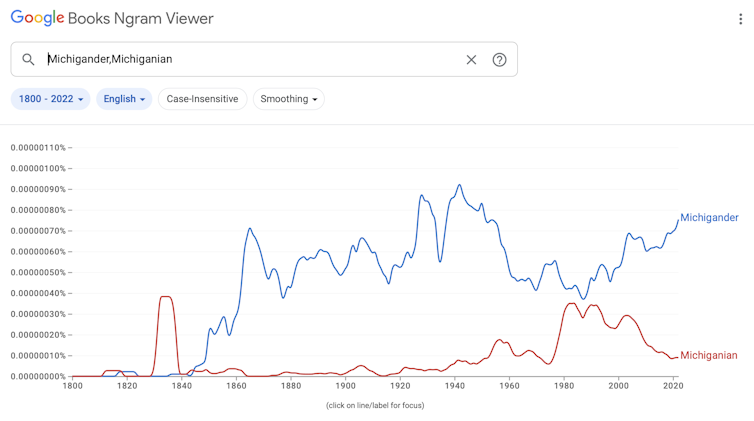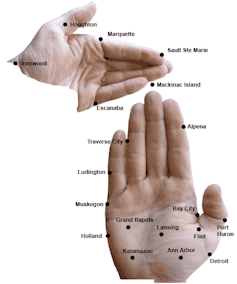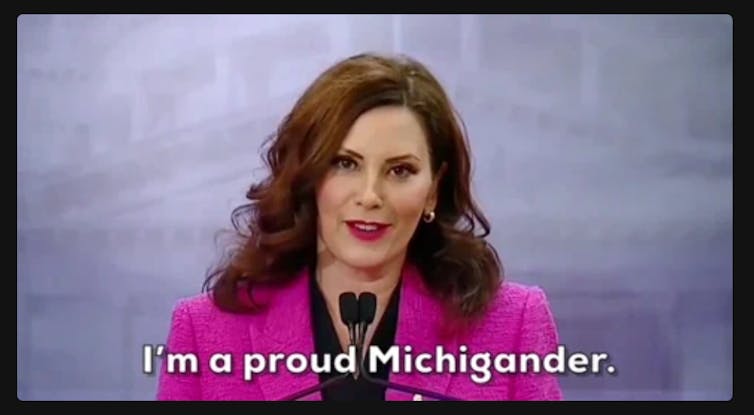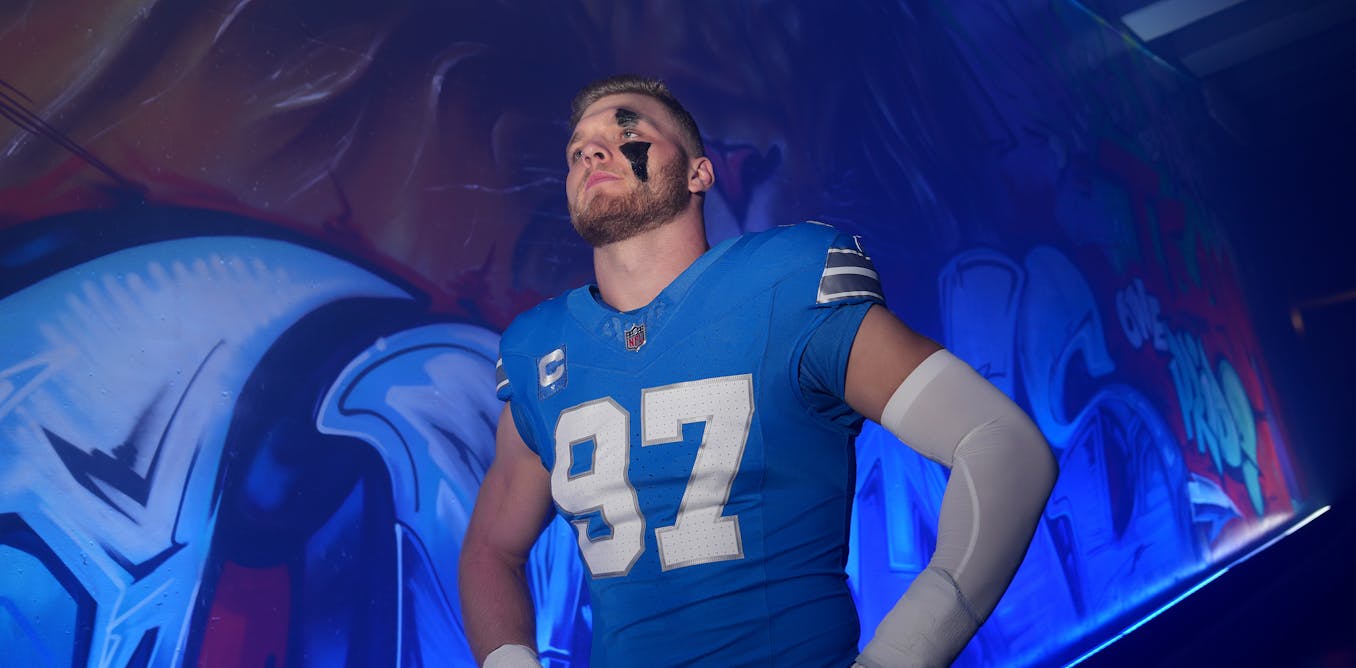Growing up in the late 1970s, my best friend was from Michigan. Early in our friendship I asked her what someone from Michigan is called. “Michigander,” she replied. I laughed and said, “You mean like a goose?” Her older sister then chimed in that it was being changed to Michiganian. Michigander is sexist, she said, since gander refers only to a male goose.
I spent the next two decades never questioning, or particularly thinking about, Michiganian.
Then, I moved to Michigan. In over 20 years living here, I’ve never heard anyone say Michiganian. People from Michigan call themselves Michiganders.
Even though it may seem rather trivial, there is endless interest in the Michigander-Michiganian question. News articles about this topic pop up fairly regularly, inevitably stating that:
-
Both terms are recognized.
-
Abraham Lincoln coined “Michigander” in 1848 to insult Michigan Gov. Lewis Cass, implying he was silly, weak and unserious.
-
Govs. James Blanchard, John Engler and Jennifer Granholm used “Michiganian,” while Govs. Rick Snyder and Gretchen Whitmer prefer “Michigander.”
-
The debate about which term is correct is ongoing.
For the most part, though, the debate seems long over. Many Michiganders haven’t heard of Michiganian, as a recent text thread with my 19-year-old neighbor illustrates:
Robin Queen, CC BY-SA
Regardless of whether there is – or ever really has been – a debate, the pas de deux between Michigander and Michiganian has an unusual history and peculiar twists and turns.
As a linguist who works on issues related to authority in language and linguistic justice, I like to investigate how terms come to be understood as correct, and on whose authority those determinations are made.
In the case of Michiganian and Michigander, Michiganian appears in style guides, and Michigander is the term most frequently used by people from Michigan.
Rooted in an insult
While it’s true that Lincoln called Cass “the great Michigander” as an unambiguous insult, the term Michigander appeared in print as early as 1838.
Despite not having coined the term, however, Lincoln did likely play a part in its popularization by using it to malign Cass.
Google’s NGram, which tracks how often terms appear in a large collection of print sources, shows Michigander has been used more frequently in print than Michiganian since around 1845.

Google NGram
No specific law designates the use of one term or the other, but the terms do appear in two Michigan laws.
The first is in the Older Michiganians Act, which was passed in 1981.
The second is tied to the Historical Markers Act. The original act, established in 1955, used the term Michigander, but an amendment to it in 2002 changed the term to Michiganian. In 2017, the act was updated and the moniker was changed back to Michigander.
Interestingly, the federal government, in the form of the U.S. Government Publishing Office’s Style Manual, specifies Michiganian as the correct term. This represents a change from Michiganite, which was the term specified in the Style Manual from 1945 to 2000, likely as a match to terms such as Wisconsinite.

U.S. Government Publishing Office Style Manual, 1945-2000
It’s difficult to know the origins of Michigander prior to 1848, but Lincoln did likely coin the term Michigander as a blend of Michigan and gander, leading to the possibility for goose jokes and humor. While other states have unusual monikers – such as Hoosiers for Indiana – none involves an animal pun like gander.
The humorous aspect of Michigander is what likely keeps the articles, Reddit threads and friendly banter going.
In 1947, the American journalist and essayist H.L. Mencken wrote, “The chief objection to Michigander is that it inspires idiots to call a Michigan woman a Michigoose and a child a Michigosling, but the people of the State have got used to this …”
Funny or sexist?
Gander humor reigns when it comes to Michigander. But perhaps more importantly, Michigander provides a greater sense of belonging and identity than Michiganian, despite the fact that there are those who find Michiganian has more finesse.
That sense of identity is evident in the many pairings of Michigander with other charming things that are a part of living in Michigan, such as using your hand to show where in the mitten-shaped state you are from.

(WT-en) TVerBeek at English Wikivoyage, CC BY-SA
Given that gander designates a male goose, Michigander does raise questions about sexism.
The rise in the use of Michiganian along with the fall of Michigander from the late 1970s to the early 2000s occurred alongside broader recognition of sexism in different realms of social life. It corresponds with a variety of changes to the terms people had been using, such as chairman, waitress and fireman. In 2024, it is unremarkable to refer instead to a chair or chairperson, a server, or a firefighter.
So, why hang on to Michigander?
Given that Whitmer is a proud and consistent user of Michigander, the most likely answer is that people from Michigan don’t feel the term is exclusionary. As a colleague of mine, a Michigan-raised feminist activist in her 60s, told me, “Do we not have real issues of sexism in the vernacular? I never heard anyone use any other term growing up.”

GIPHY News
Over the past several days, I’ve asked over two dozen people who were born and raised in Michigan what they call someone from Michigan. To a person, they have said Michigander. They range in age from 19-89, have different gender identities and racial affiliations, and have a wide range of professions and political orientations.
Only one had ever heard anyone referred to as a Michiganian, while a third had never heard the term Michiganian at all.
My results reflect other poll results about these terms. A clear majority choose Michigander.
When the people of Michigan say they are Michiganders, it’s odd to insist that they are Michiganians. And even those few, such as The Detroit News, who prefer Michiganian acknowledge that Michigander is more broadly preferred.
Ultimately the debate rests on whether it’s the people from Michigan or some other entity, such as the Government Publishing Office, that decides which term should be used. If we grant the people of Michigan the right to name themselves, the verdict is clear.




